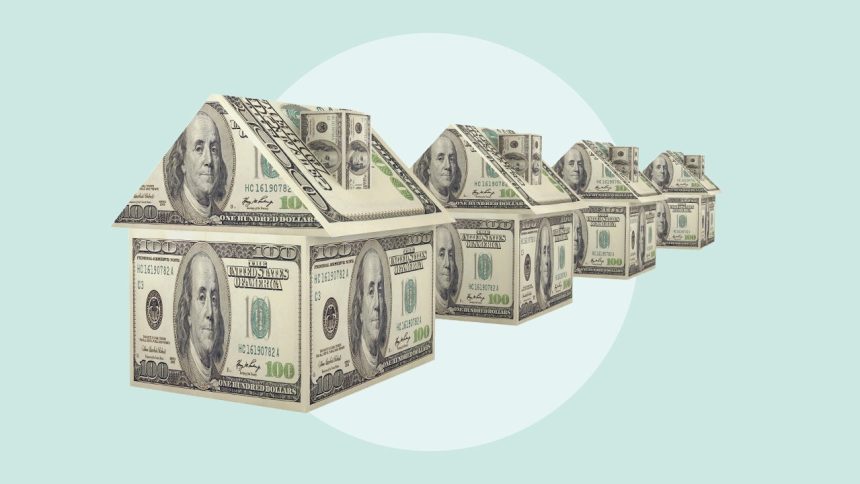Key takeaways
- A persistent shortage of available homes has led to intense competition among buyers, contributing to rising prices.
- In addition, elevated mortgage interest rates have significantly increased the cost of borrowing.
- Rising costs of building materials, labor, and overall inflation further exacerbate high home prices.
Why are homes so expensive right now? A variety of factors have contributed to higher sale prices, including mortgage interest rates, low inventory and inflation. Here, we take a closer look at how market conditions and outside influences can affect home prices — plus, tips on how to become a homeowner for less.
Why are houses so expensive?
Data over the past few years show that home prices have rocketed ever higher. As of February 2025, the median existing-home sale price was $398,400, per the National Association of Realtors (NAR). That marked the 20th consecutive month of year-over-year price jumps and an increase of 3.8 percent from the previous year.
Go back five years though, to when the pandemic first began, and the median home price was just $280,700. The steep climb since then has been remarkable, and experts say a myriad of factors have contributed to the affordability predicament the market is in now.
“It’s the basic rule of supply and demand — we don’t have enough homes, and there are more buyers than there are available houses,” says Nadia Evangelou, NAR’s senior economist and director of real estate research. “A shortage means buyers are competing for fewer homes. When there are multiple offers, the winning offer often exceeds the list price, pushing prices higher across entire markets.”
Leo Pond, a real estate advisor with Four Seasons Sotheby’s International in Rutland, Vermont, blames today’s high prices on a combination of limited supply, sustained buyer demand, elevated construction costs and high mortgage rates. He says it’s no surprise that many hopeful buyers, and especially first-time buyers, are being pushed to the sidelines in an affordability crunch.
“First-time purchasers are particularly affected, because they don’t have equity from a previous home sale to help offset costs,” Pond says. “Meanwhile, current homeowners are staying put due to rate lock-in — they don’t want to trade a 3 percent mortgage rate for a rate over 6.5 percent, which reduces inventory. It’s the perfect storm that explains why the housing market is so hard to get into right now.”
The housing shortage
The amount of homes available for sale has been increasing lately, but given the dire shortage the market had been experiencing, the uptick is still not enough. In February 2025 the country had a 3.5-month supply of available homes, per NAR, which represents a 17 percent increase from February 2024. But a well-balanced real estate market — one that doesn’t tilt in favor of either buyers or sellers — generally requires 5 to 6 months’ worth. There just isn’t enough housing supply in the pipeline to satisfy buyers, which often leads to bidding wars and drives prices higher.
“Part of the problem is that homebuilders are not constructing enough homes,” says Evan Luchaco, a home loan specialist with Churchill Mortgage in Portland, Oregon. “After the 2008 housing crash, builders became more cautious about constructing spec-home developments, which are a primary source for first-time buyer properties.”
Addressing this housing deficit is crucial for stabilizing home prices and ensuring that more homebuyers have access to affordable options. In addition, he says, housing demand continues to surge because the population of first-time purchasers keeps increasing every year: “The average first-time buyer is approximately 33 years old,” Luchaco says. “Looking back at birth-rate statistics from the late 1980s through the 2000s, almost every year saw more people born than the year before.”
Higher mortgage rates
Another culprit? Mortgage interest rates, which have climbed quickly and significantly since their pandemic lows, making it harder than ever to afford a home purchase. The average rate for a 30-year mortgage was 6.83 percent as of early April 2025, according to Bankrate’s latest survey of large lenders. Compare that to the average annual rate of just 3.15 percent in 2021.
“Higher mortgage rates have a significant impact on housing affordability,” says Paul Epperley, president of the Greater Fort Worth Association of Realtors in Texas. “They increase the cost of your monthly payments, thereby reducing the affordability factor.”
Example
To demonstrate how higher rates can ice out buyers, consider this scenario: Let’s say you purchase a $400,000 home and put down a 20 percent down payment, leaving you with a $320,000 fixed-rate 30-year mortgage loan. As Bankrate’s mortgage calculator shows, at an interest rate of 3.5 percent, your monthly principal and interest payment would be $1,437. Buy the same house with the same loan at a rate of 6.5 percent, though, and that number shoots up to $2,023. That’s $586 more every month, or more than $7,000 extra per year. Over 30 years, that equates to more than $200,000 in additional interest.
“These higher borrowing costs reduce the purchasing power of prospective buyers, making homes feel significantly more expensive and contributing to continued affordability challenges across the housing market,” says Pond.
Inflation
High inflation makes matters even more difficult. “Inflation doesn’t just raise the cost of everyday goods — it also drives up the cost of construction and often leads to higher mortgage rates, which together make homeownership more expensive,” Evangelou says. “For example, lumber prices today are still 20 percent higher than they were before the pandemic.”
According to the National Association of Home Builders’ most recent Cost of Construction Survey, construction costs are at a record high, accounting for 64.4 percent of the average price of a new home. Tariffs on imported building materials don’t help either. And inflation erodes the dollar’s purchasing power, too, making it more challenging for home shoppers to save for down payments and closing costs.
Money-saving tips for homebuyers
While it’s certainly a challenging environment for house hunters, there are ways to make affording a home more achievable:
- Look into assistance programs: Check out state and local down payment assistance programs to see if you qualify for financial help — these are designed to help make homeownership more attainable, especially for first-time buyers.
- Shop around for loans: Different lenders offer different rates and terms, so do some comparison shopping to find the best deal. Remember, too, that not all loans require a 20 percent down payment.
- Consider a fixer-upper: A home in need of upgrades is usually cheaper, and you can make the necessary improvements over time, as your finances allow. “There are great deals to be found on homes that need a few cosmetic updates,” says Epperley. “Many older homes have fantastic character and solid structures. If you can look past the paint colors or dated flooring, it can be an excellent investment.”
- Compromise on size: A smaller home is also usually cheaper, which can get you on the homeownership ladder for less. In fact, February 2025 NAR data shows that the median price for a condo was almost $50,000 less than that of a single-family home.
- Broaden your search range: You get more for your money in some locations than others, so if you can’t afford your dream area, look on the outskirts. “Expand your search radius beyond the most in-demand neighborhoods, which can lead to more affordable options with similar amenities,” says Pond.
- Look for over-ripe listings: “The longer a home has been listed, the more likely a seller will be to negotiate,” Luchaco says. “Start your search by looking for homes that have been listed for more than 90 days. Then, open it to homes listed for more than 60 days, then down to more than 30 days.”
- Partner with a pro: Finally, keep in mind that a seasoned Realtor knows things about your local market that you probably don’t, including where to find a great deal. “Work closely with an experienced local real estate agent, who may have access to off-market listings or price-reduced properties,” Pond says. When it comes time to make an offer, agents are also skilled negotiators who will put those skills to work on your behalf.
FAQs
Read the full article here















